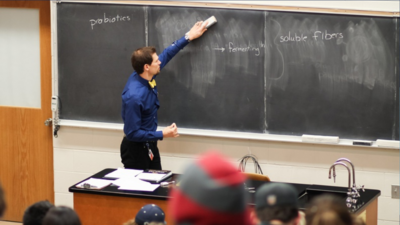Types of College Courses You Should Take

Going to college means adopting a new set of responsibilities; building one’s own class schedule is one significant such responsibility. Although college students are expected to choose majors and minors, they still have a lot of flexibility when it comes to choosing specific courses to take. Between general education courses, electives required by one’s major and empty space in a semester that could fit a few more credits, students have ample opportunity to choose and experience courses from across the broader curriculum.
College, especially the “general education” portion, is designed so that students can have experiences outside of their major and minor fields of study. However, knowing which courses to choose outside of a prescribed sequence can be difficult – so here are some ideas of criteria for selecting courses that will make your time in college not only well-spent, but well-rounded.
Courses that pique your interest
When deciding upon electives or general education courses, taking classes that sound fun or interesting is always a good place to start. Especially within general education requirements, you may find that you can choose from a list of courses in a particular discipline. At Concordia, students must take two general courses in the natural sciences, which includes physics, biology and chemistry. Perhaps you’ve always wanted to know a bit more about meteorology and oceanography – that fulfills the course requirement just as much as a course in zoology or nutrition does! Sometimes, course selection means following your passions and choosing to get credit in a way that might even be fun.
Courses for your major(s) and minor(s)
Of course, the time will come when you must complete the required courses for your major; hopefully, these courses are already intriguing to you and won’t make you bored or unmotivated! Check out Concordia’s academic catalog for program requirements, and make sure to fit these classes into your schedule. For example, if you major in computer science but have a minor in marketing, a semester schedule for you might include both calculus and consumer behavior – both required courses, but still varied and interesting!
Courses that challenge you
In some cases, learning can be fun and challenging at the same time. Therefore, students should purposefully choose to enroll in courses that they know will challenge them and their abilities. In college, much learning takes place in courses that are often considered “difficult.” Although learning through challenges may be uncomfortable for many students, these courses can be extremely rewarding and teach students how to approach struggles they may face in their future career.
Hands-on and practical courses
Writing papers is important, and so is knowing how to interpret data, take tests and keep good notes. However, learning skills by doing can be just as vital – or sometimes, even more so. Courses that are “hands-on” or teach practical skills can be part of a student’s major, fall into the category of “electives” or be choices in the general education curriculum. Fortunately, there are hands-on courses in nearly every major, from laboratory practice in the natural sciences to CPR and exercise courses in the health and human performance department. Choosing to take courses like these can not only interrupt one’s everyday routine of lecture-based classes but can teach skills that are directly transferable to the world outside of college.
Courses that will supplement your future career path
Finally, students should take courses that will reinforce or inform their decision about their future career path and build skills specific to their vocation. Whether these are required courses, electives within a major pointing students toward a certain specialty, or courses taken to fill open credits in a certain semester, purposeful efforts to strengthen one’s knowledge of their future career path are crucial. Since every student’s vocation is unique, this may look different depending on one’s specific career goals, even among students in the same program of study. Consider not only your desired post-graduate title, but also whether you want to attend graduate school, populations with which you may want to interact and even the region in which you want to live.
The options with which students are met when making choices about enrolling in classes can be so many that decisions can become difficult to make. Choosing courses from the categories listed above, however, can help students narrow down their options and make intentional, purposeful decisions about the courses they will take during their undergraduate career.
Interested in studying at Concordia University, Nebraska? Learn more here.
Related Stories


